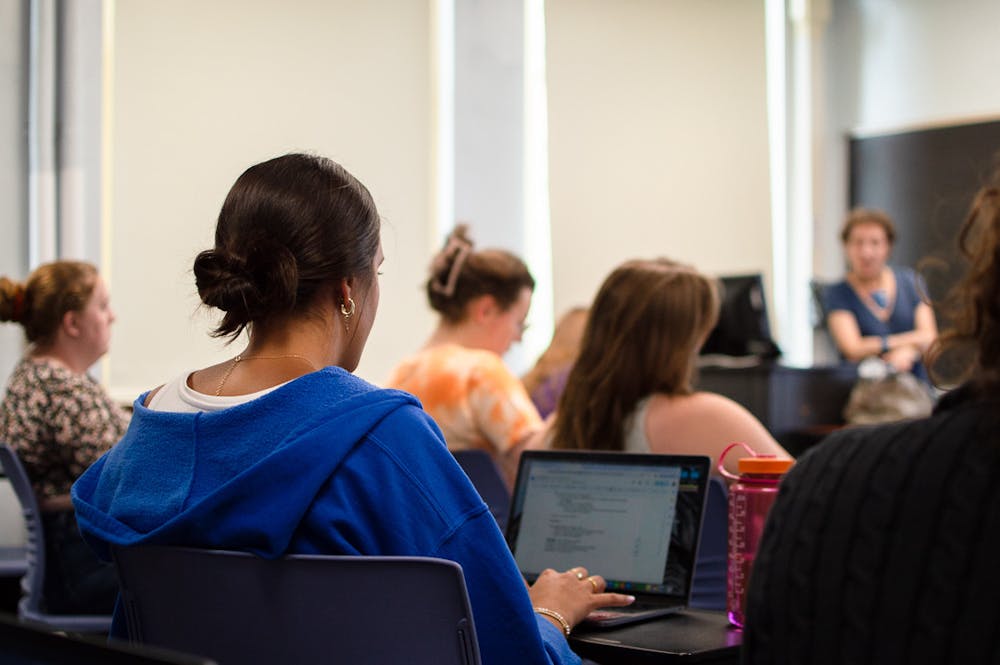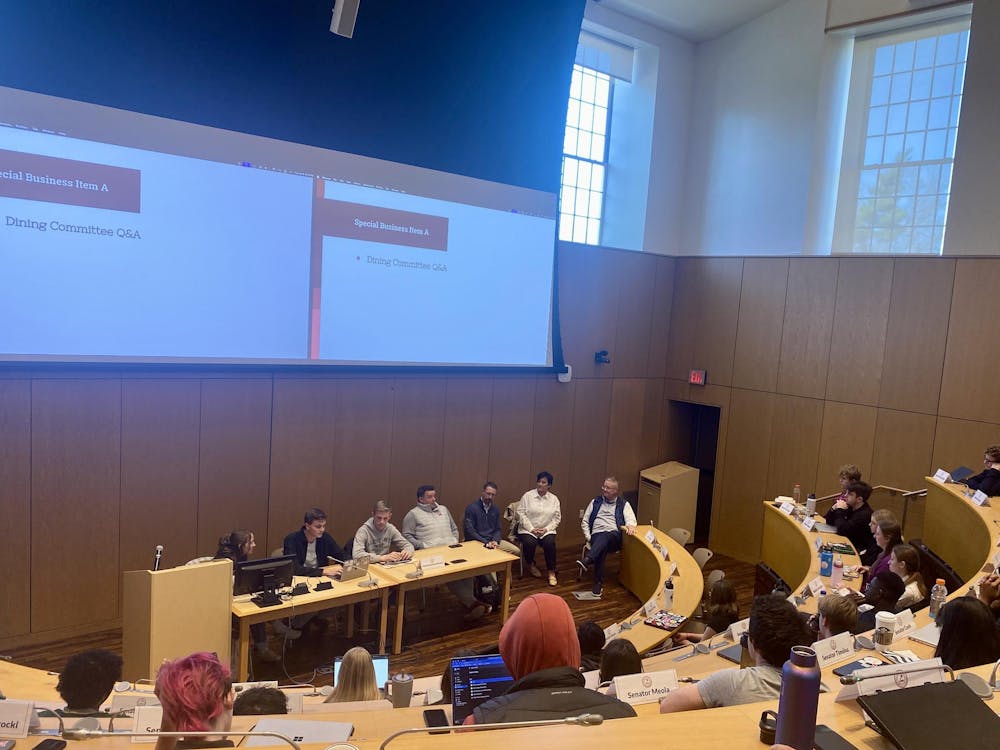The end of August welcomed thousands of students to Miami University’s red-brick campus to begin or continue studying their declared fields of interest.
Engineering majors returned to Benton Hall, data science analyzers enjoyed their newly-built home in McVey Hall and professors returned to their classrooms. However, for junior pre-med and classical studies double major Gavriella Bernstein, the return of this school year meant one of the last opportunities she and her fellow classical studies majors would have to study the language and culture as a major.
Miami executively deciding to morph, change and eliminate certain humanities majors began the end of an era
“It’s such a shame, really,” Bernstein said. “They’re cutting all of these awesome [majors] that are beneficial to a liberal education.”
Classical studies, along with French, German, Russian, Italian and East Asian languages will be combined and replaced by a single major in world languages and cultures, which will include smaller sub-tracks for the prospective languages a student is studying. This change will not be made until all current students graduate with their prospective language degrees.
For Bernstein, her classical studies major offers a more insightful perspective on history and the world around her, and cited “Justice and Law in Antiquity” (CLS 321H) as just one class where she learned unique perspectives from “brilliant scholars” that came before us.
Sandra Garner, chair of the global and intercultural studies (GIC) department, said these changes affected more than those studying languages. The combined major, made effective in the fall of 2023, meant restructuring how her department would be available to students, both for classes and majors.
The GIC department lost majors in American studies, critical race and ethnic studies, women, gender and sexuality studies and Latin American studies, all as a result of Miami's response to the national trend of humanities majors declining in popularity. This leaves international studies as the only full major the department will offer students.
Despite Garner and her department’s efforts to remain a viable option to students, she said, in the end, her department couldn’t do much.
“We always kept all of our courses filled, and did a really good job with integrating ourselves into the Miami Plan,” Garner said, “but really the only number that the university is paying attention to are the number of actual declared majors.”
Critical race and ethnic studies have three declared majors in Miami’s undergraduate population. Low enrollment numbers like those are what made the humanities majors the front of Miami’s efforts to eliminate majors with 35 students or less.
Dean of the College of Arts and Science (CAS) Renée Baernstein said the decision to eliminate majors started five years ago when Miami identified its lowest enrolled majors, which were then given five years to come up with and execute a plan to meet enrollment benchmarks. The 22 departments handed in their final plans in December 2023, and once the majors did or did not meet the discussed standards, the decision was moved to the administrative level.
Enjoy what you're reading?
Signup for our newsletter
National trend
Miami is not unique in having a declining interest in humanities majors: according to research done by the American Academy of Arts and Sciences, humanities majors had the most severe decline in enrollment out of all bachelor’s degrees across the nation, falling by nearly a third in enrollment rates from 2012 to 2022 – 13.1% to 8.8%.
Despite national declining enthusiasm for a degree in the humanities, Baernstein said Miami will not shy away from giving the remaining majors in this department every opportunity possible. This includes the $72 million renovation project Bachelor Hall is undergoing in order to give several humanities majors a new and improved home.
The project began last spring, and doors to the renovated space will open in the fall of 2026. Funding for the project came from both the state and a grant from the National Endowment for the Humanities, which Baernstein said was no small feat.
“The administration worked very hard to get that funding, and I think we should not underestimate how much that means that they put the humanities first,” she said. “They could have put other buildings on their wishlist, but they put this first.”
The media, journalism and film department’s Rick Ludwin studio will be included in Bachelor Hall, along with a Will Haygood, winner of the Freedom Summer of ‘64 Award last fall, space downstairs.
Additionally, Baernstein said CAS is taking on the Humanities Futures initiative, which began as a provost initiative last year. This task will include public outreach and communications and marketing efforts with the goal of promoting the benefits of a humanities major to potential Miami students. The initiative also includes more career opportunities and training for current humanities students who are unclear of what they want to pursue with their major post-graduation.
Representatives from the humanities programs at Miami have also been setting up tables at various academic fairs around campus, handing out pamphlets titled “The Path to Research in the Humanities,” “Humanities Engagement Certificate Program” and “Environmental Justice,” presented by the John W. Altman Program in the Humanities. These programs offer career advice and opportunities for those pursuing a humanities degree.
However, despite these efforts to promote the humanities, Garner still worries about these majors’ visibility to incoming students.
“[Students] look at our course catalog as being thick and say, ‘Oh, that’s too much,’ and they look at the number of majors offered and think, ‘How can anyone find anything in here?’” Garner said. “You go to the Miami website and try to find global and intercultural studies … and we’re being buried very deeply within that kind of visibility structure of the university.”
For this school year, Garner said her department will be focusing on increasing its visibility on campus, including partnering with the Tandana organization, a nonprofit foundation focused on on-the-ground work in both Guatemala and Mali. Garner added that professional opportunities like this will excite students in the different possibilities of a GIC major, which Garner and Bernstein both agree have endless applications in real-world jobs.
The Tandana Foundation will be presenting two upcoming lectures in order to boost visibility and increase participation in humanities. GIC will be hosting a lecture titled “Transforming Gender Norms: Opening Small Spaces for Big Change in Rural Mali and Ecuador,” on Wednesday, Nov. 13 at 4:30 p.m. in the Heritage Room in the Shriver Center. The Grayson Kirk distinguished lecture will be hosted by Anna Taft, director of the Tandana Foundation on Thursday, Nov. 14 at 4:30 p.m., also in the Heritage Room.
“I think a humanities degree is one of the best degrees you can get, and our alumni will attest to that,” Baernstein said.
This school year will very well be the last surviving year of several majors, and for students like Bernstein, they can only think of the negative repercussions condensing and cutting these majors will have on future students, both at Miami and nationally.
“Miami’s classical studies program is the reason I chose to go to school here,” Bernstein said. “So as for future students, they won’t have the opportunity to choose to expand their knowledge base in those directions. Cutting these majors implies we no longer have anything to learn from them, when really, [the information] is unending.”




